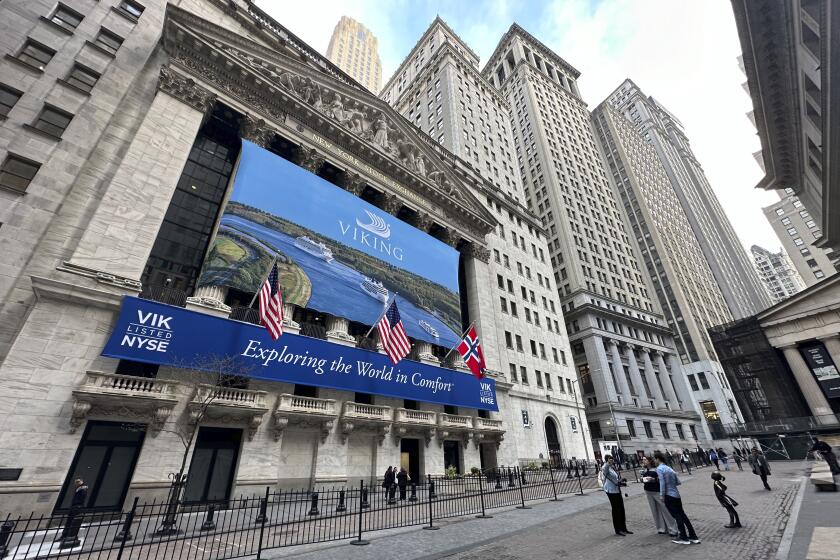It’s bad, but is it that bad?
This is not the way the financial Armageddonites wanted to start the year.
A global stock market rally? Don’t people know that an economic collapse is coming?
All over the Internet, the idea of imminent cataclysm is a popular read nowadays. The issue is not just recession or depression but The End of the U.S. economy as we know it.
Michael Panzner, a veteran Wall Street trader, operates the website Financial Armageddon. He has a book of the same title.
“No Cause for Optimism,” reads the latest post on Panzner’s site. It’s about the employment outlook, but it might as well be about everything, from his standpoint.
On the Wall Street Journal’s website the last few days, the most-viewed story was a piece about a Russian academic who believes that economic hardship in the U.S. will lead to civil war and the breakup of the nation in 2010.
California and other Western states will become part of China or under its influence, the professor asserts. The Northeast, he says, will want to join the European Union. Texas will go to Mexico.
Understandably, the events of 2008 just emboldened the financial Armageddonites. They were, after all, partly right: We lived through the worst banking crisis since the 1930s, which in turn triggered a severe recession and the worst stock losses also since the ‘30s.
Stocks have bounced since late November, but that’s no assurance that this bear market is over. In December, an index of U.S. manufacturing activity plunged to its lowest level in 28 years, a report Friday showed. So the economy’s cliff dive is continuing.
We know that the federal government is throwing trillions of dollars at the financial system and the economy, trying to make sure Great Depression II doesn’t happen.
The Armageddonites say it won’t work. More to the point, I think many of them don’t want it to work.
Why? On The Times’ Money & Co. blog, and on countless other investing and economic websites, many people who take the time to comment on the U.S. financial-system disaster see it as the inevitable comeuppance for the nation’s borrow-and-spend mentality of the last 25 years.
Americans who didn’t borrow to the hilt, didn’t lease a new BMW every year, didn’t live far beyond their means, are bitter about the friends, neighbors and family members who epitomized those excesses -- and who now want federal help, including via mortgage modifications, lower interest rates and jobless benefits.
Those who lived irresponsibly deserve their misery, I hear over and over.
I don’t disagree. But the problem in wishing for an economic catastrophe to punish the guilty is that a new Depression, or worse, wouldn’t ruin just the profligate. It would drag us all down.
From a practical viewpoint, if economic Armageddon is your forecast, why bother reading anything about investing? An economic collapse could render every investment worthless, perhaps with the exception of gold.
And if things are going to get that bad, those who own gold are likely to have it taken away at gunpoint. Canned soup might be a smarter investment than bullion.
Separate from the Armageddonites, there is another camp of pessimists who see hard times ahead, but not End Times. If nothing else, their less-dire outlook allows for the possibility of investment moves that could help shelter one’s portfolio from the worst of what’s coming.
Many in this camp believe that the government’s efforts to avoid a rerun of the 1930s -- a deflationary Depression -- will succeed, thanks to the tidal wave of federal dollars flowing into the financial system and economy.
But the penalty, they say, will be a new surge in inflation that will inflict long-term harm on the economy and erode the value and appeal of many investments, particularly low-yielding Treasury bonds.
The government “is going to get what it wants -- they’re going to inflate the economy in 2009,” said Michael Pento, senior market strategist for Delta Global Advisors in Huntington Beach.
He believes the inflation rate, which lately has been negative (deflation), will rise to between 3% and 5% in 2009, and will be “accelerating greatly.” In that environment, investors will turn back to hard assets, particularly commodities, as inflation hedges, Pento said.
What’s more, absent a global economic collapse, investors should focus on companies that meet people’s basic needs, including food, he said. He likes stocks of agricultural firms such as seed producer Monsanto Co. and fertilizer maker Mosaic Co., both of which plunged in 2008.
A broader theme of the hard-times-not-End-Times camp is that the U.S. is facing a long period of anemic economic growth as consumers pay down their debt loads.
“Lowering debt and consumption levels will likely cause a severe drag on growth,” hedge fund giant Bridgewater Associates noted in a report to clients this week.
One result, the firm says, is that the coming decade is likely to be characterized by “a shift away from a . . . U.S.-dollar-centric financial system and toward a world where a higher portion of the world’s wealth and economic activity resides abroad, particularly in emerging markets.”
That could mean that foreign investments will be crucial over the next few years if you’re hoping to buttress your portfolio against a weak domestic economy and another potentially long period of devaluation for the dollar.
So the steep declines last year in foreign stock markets, many of which fell more sharply than U.S. shares, could be a gift for patient investors -- provided, of course, that you believe the end of the world remains postponed indefinitely.
--






